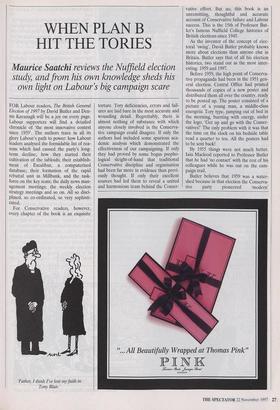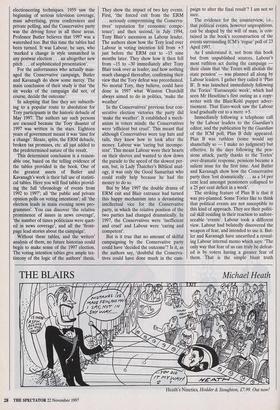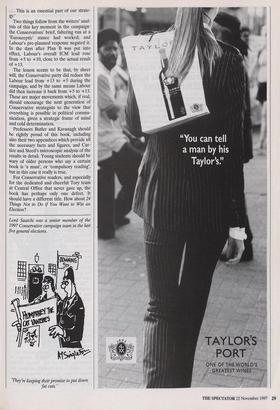WHEN PLAN B HIT THE TORIES
Maurice Saatchi reviews the Nuffield election
study, and from his own knowledge sheds his own light on Labour's big campaign scare
FOR Labour readers, The British General Election of 1997 by David Butler and Den- nis Kavanagh will be a joy on every page. Labour supporters will find a detailed chronicle of 'the most innovative contest since 1959'. The authors trace in all its glory Labour's path to power: how Labour leaders analysed the formidable list of rea- sons which had caused the party's long- term decline; how they started their cultivation of the tabloids; their establish- ment of Excalibur, a computerised database; their formation of the rapid rebuttal unit in Millbank, and the task- force on the key seats; the daily news man- agement meetings; the weekly election strategy meetings and so on. All so disci- plined, so co-ordinated, so very sophisti- cated.
For Conservative readers, however, every chapter of the book is an exquisite Father, I think I've lost my faith in Tony Blair.' torture. Tory deficiencies, errors and fail- ures are laid bare in the most accurate and wounding detail. Regrettably, there is almost nothing of substance with which anyone closely involved in the Conserva- tive campaign could disagree. If only the authors had included some spurious aca- demic analysis which demonstrated the effectiveness of our campaigning. If only they had proved by some bogus psepho- logical sleight-of-hand that traditional Conservative discipline and organisation had been far more in evidence than previ- ously thought. If only their excellent sources had led them to reveal a united and harmonious team behind the Conser- vative effort. But no, this book is an unremitting, thoughtful and accurate account of Conservative failure and Labour success. This is the 15th of Professor But- ler's famous Nuffield College histories of British elections since 1945.
As the inventor of the concept of elec- toral 'swing', David Butler probably knows more about elections than anyone else in Britain. Butler says that of all his election histories, two stand out as the most inter- esting: 1959 and 1997.
Before 1959, the high point of Conserva- tive propaganda had been in the 1951 gen- eral election. Central Office had printed thousands of copies of a new poster and distributed them all over the country, ready to be posted up. The poster consisted of a picture of a young man, a middle-class energetic Tory type, jumping out of bed in the morning, bursting with energy, under the logo, 'Get up and go with the Conser- vatives!' The only problem with it was that the time on the clock on his bedside table read a quarter to ten. All the posters had to be sent back!
By 1955 things were not much better. Iain Macleod reported to Professor Butler that he had `no contact' with the rest of his colleagues while he was out on the cam- paign trail.
Butler believes that 1959 was a water- shed because in that election the Conserva- tive party pioneered 'modern' electioneering techniques. 1959 saw the beginning of serious television coverage, mass advertising, press conferences and private polling, and the Conservative party was the driving force in all these areas. Professor Butler believes that 1997 was a watershed too. But this time the tables had been turned. It was Labour, he says, who `marked a change in style unmatched in any postwar election . . . an altogether new pitch . . . of sophisticated presentation'.
For the unfortunates who actually man- aged the Conservative campaign, Butler and Kavanagh do show some mercy. The main conclusion of their study is that 'the six weeks of the campaign did not, of course, decide the outcome'.
In adopting that line they are subscrib- ing to a popular route to absolution for Tory participants in the historic debacle of May 1997. The authors say such persons are excused because the Tory disaster of 1997 was written in the stars. Eighteen years of government meant it was 'time for a change'. Sleaze, splits, the ERM debacle, broken tax promises, etc. all just added to the predetermined nature of the result.
This determinist conclusion is a reason- able one, based on the telling evidence of the tables provided in the book. One of the greatest assets of Butler and Kavanagh's work is their full use of statisti- cal tables. Here you will find tables provid- ing the full 'chronology of events from 1992 to 1997'; all 'the public and private opinion polls on voting intentions'; all 'the election leads in main evening news pro- grammes'. You can discover 'the relative prominence of issues in news coverage', `the number of times politicians were quot- ed in news coverage', and all the 'front- page lead stories about the campaign'.
Without these tables, and the writers' analysis of them, no future historian could begin to make sense of the 1997 election. The voting intention tables give ample tes- timony of the logic of the authors' thesis. They show the impact of two key events. First, 'the forced exit from the ERM . . . seriously compromising the Conserva- tives' reputation for economic compe- tence'; and then second, in July 1994, Tony Blair's ascension as Labour leader. The authors show how the Tory lead over Labour in voting intention fell from +5 just before the ERM exit to –15 nine months later. They show how it then fell from –15 to –30 immediately after Tony Blair took over as leader, and how nothing much changed thereafter, confirming their view that the Tory defeat was preordained. No mortal Tory, they believe, could have done in 1997 what Winston Churchill always aimed to do in politics, 'make the weather'.
In the Conservatives' previous four con- secutive election victories the party did `make the weather'. It established a mech- anism in voters minds: the Conservatives were 'efficient but cruel'. This meant that although Conservatives wore top hats and tails, they knew how to look after the money. Labour was 'caring but incompe- tent'. This meant Labour wore their hearts on their sleeves and wanted to slow down the parade to the speed of the slowest per- son, but, in Lady Thatcher's Biblical anal- ogy, it was only the Good Samaritan who could really help because he had the money to do so.
But by May 1997 the double drama of ERM exit and Blair entrance had turned this happy mechanism into a devastating intellectual vice for the Conservative party, in which the relative position of the two parties had changed dramatically. In 1997, the Conservatives were 'inefficient and cruel' and Labour were 'caring and competent'.
But is it true that no amount of skilful campaigning by the Conservative party could have 'decided the outcome'? Is it, as the authors say, 'doubtful the Conserva- tives could have done much in the cam- paign to alter the final result'? I am not so sure.
The evidence for the counterview, i.e., that political events, however unpropitious, can be shaped by the will of man, is con- tained in the book's reconstruction of the events surrounding ICM's 'rogue' poll of 23 April 1997.
As I understand it, not from this book but from unpublished sources, Labour's most ruthless act during the campaign their claim that 'the Tories will abolish the state pension' — was planned all along by Labour leaders. I gather they called it 'Plan B'. It was launched immediately following the Tories' Eurosceptic week', which had seen Mr Heseltine's first outing as a copy- writer with the Blair/Kohl puppet adver- tisement. That Euro-week saw the Labour lead gradually cut to a mere +5.
Immediately following a telephone call by the Labour leaders to the Guardian's editor, and the publication by the Guardian of the ICM poll, Plan B duly appeared. Plan B was ruthless (some would say shamefully so — I make no judgment) but effective. In the days following the pen- sions attack, partly thanks to the Tories' over-dramatic response, pensions became a salient issue for the first time. And Butler and Kavanagh show how the Conservative party then 'lost dramatically . . . as a 14 per cent lead amongst pensioners collapsed to a 25 per cent deficit in a week'.
The striking feature of Plan B is that it was pre-planned. Some Tories like to think that political events are not susceptible to this kind of approach. They see their politi- cal skill residing in their reaction to unfore- seeable 'events'. Labour took a different view. Labour had belatedly discovered the weapon of fear, and intended to use it. But- ler and Kavanagh have unearthed a reveal- ing Labour internal memo which says: 'The only way that fear of us can truly be defeat- ed is by voters having a greater fear of them. That is the simple blunt truth • . . This is an essential part of our strate- gy.'
Two things follow from the writers' anal- ysis of this key moment in the campaign: the Conservatives' brief, faltering run at a Turosceptic' stance had worked; and Labour's pre-planned response negated it. In the days after Plan B was put into effect, Labour's overall ICM lead rose from +5 to +10, close to the actual result of +13.
The lesson seems to be that, by sheer will, the Conservative party did reduce the Labour lead from +13 to +5 during the campaign, and by the same means Labour did then increase it back from +5 to +13. These are major movements which, if real, should encourage the next generation of Conservative strategists to the view that everything is possible in political commu- nication, given a strategic frame of mind and cold determination.
Professors Butler and Kavanagh should be rightly proud of this book, including also their two appendices which provide all the necessary facts and figures, and Cur- tice and Steed's microscopic analysis of the results in detail. Young students should be wary of older persons who say a certain book is 'a must', or 'compulsory reading', but in this case it really is true.
For Conservative readers, and especially for the dedicated and cheerful Tory team at Central Office that never gave up, the book has perhaps only one defect. It should have a different title. How about 24 Things Not to Do if You Want to Win an Election?
Lord Saatchi was a senior member of the 1997 Conservative campaign team in the last five general elections.
`They're keeping their promise to put down fat cats.'




















































































 Previous page
Previous page